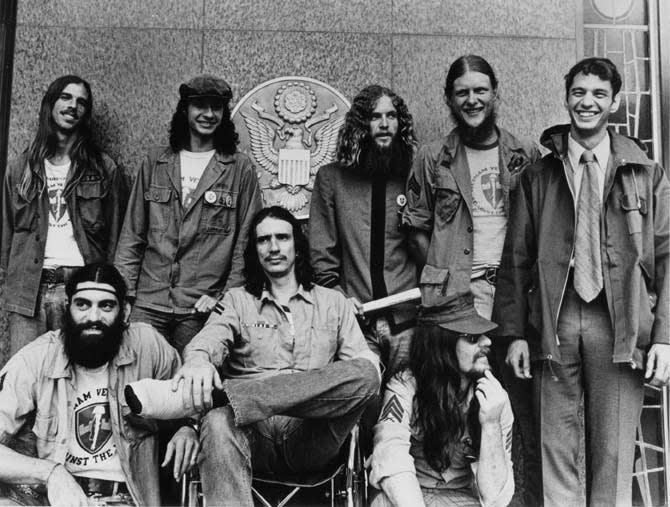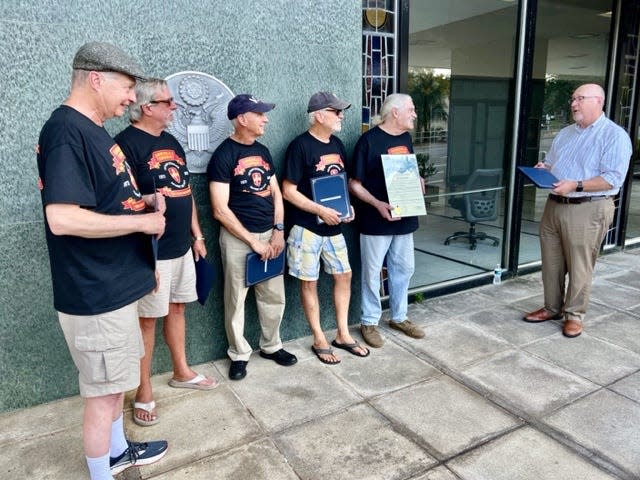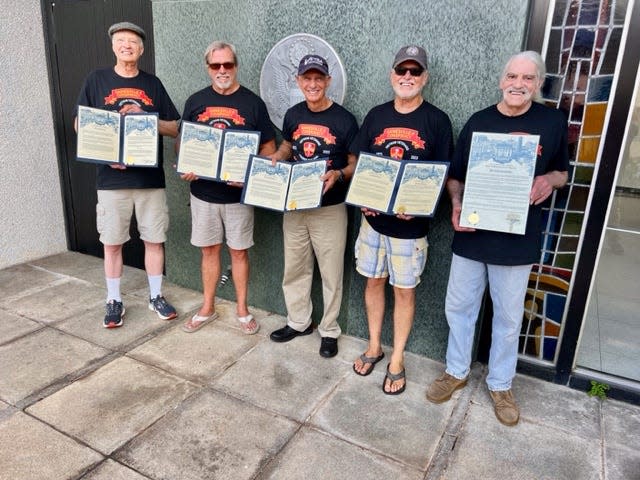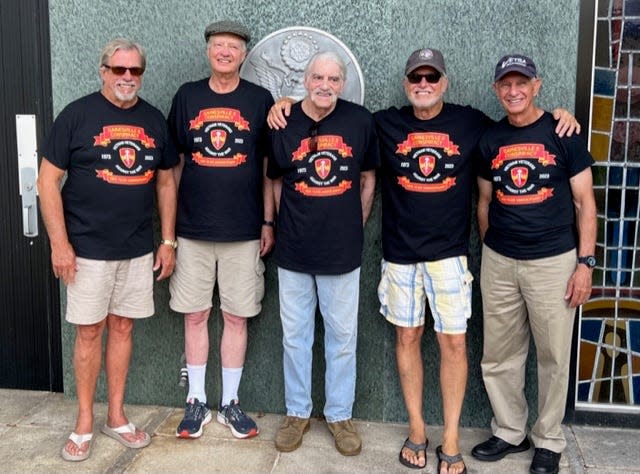Gainesville Eight anti-war activists honored 50 years after historic local trial
- Oops!Something went wrong.Please try again later.
The last time they gathered on the steps of Gainesville’s federal courthouse, they were eight strong.
Eight young men, all of whom erupted in celebration after learning that their jury declined to send them to prison after being accused of plotting to disrupt the 1972 Republican National Convention in Miami Beach.
That was half a century ago.
Last week, the five surviving defendants of the 1973 Gainesville Eight trial − one of several Nixon-era conspiracy trials aimed at suppressing anti-war activism − returned for another group photo on the courthouse steps.
Only this time, instead of facing bailiffs, FBI agents, or federal marshals, these now elderly men were welcomed back to Gainesville by Mayor Harvey Ward, who read a proclamation commending them for occupying a “special place in the history of our community and our nation.”
From now on, Aug. 31, 2023, would be now known as “Gainesville Eight Day” in the city that lent their trial its name.
“I thought it was important to come back,” said Don Purdue, a 74-year-old former combat Marine who went on to have a career in emergency response management in Broward County. “Vietnam was an important part of my life,” as was joining the Vietnam Veterans Against The War (VVAW) and subsequently being put on trial.
“Looking back, I sometimes wish I had done more (for the cause of peace)."

“We are glad you’re here,” Ward told them.
Three of the eight defendants, John Kniffin, William Patterson and Alton Foss have since passed away. But the remaining five bear little resemblance to the lean, hirsute, combat-hardened defendants who posed in front of the courthouse seal for an iconic photo 50 years ago.
Their hair noticeably thinned and whitened. Jowls are a bit heavier perhaps. Their weight is somewhat redistributed.
But if the flesh is noticeably weaker, the spirit that once compelled them to throw away their medals and take to the streets is still willing.
“I’ve always been me,” said Scott Camil, the longtime Gainesville peace activist and local political campaign organizer who federal prosecutors deemed the ringleader of the accused conspirators.
It wasn't his last brush with the law.
“I’ve had several other trials,” he added. They even shot me once.”
Twice wounded as a marine in Vietnam, Camil was shot in the back in 1975 by DEA agents in a Gainesville sting. Subsequently charged with drug offenses and resisting arrest, Camil was, once again, found not guilty.
“I guess that the government was used to intimidating people. Vietnam veterans weren’t the kind of guys you could intimidate," said Camil, noting the failure of the U.S. Department of Justice to get guilty verdicts in the Gainesville Eight, Chicago Seven, Camden 28 and Harrisburg Seven conspiracy trials. "We stood up to them.”

Larry Turner, a retired attorney and former circuit court judge, was a junior member of the Gainesville Eight defense team and also represented Camil in his other trials.
“I’m a much better lawyer for having gone through that trial and working with some of the best lawyers in the country,” Turner said. “Not many young lawyers had the opportunity to get a good case with a good cause. A case you think can win if you do a good job.”
Beyond that, Turner reflected, having grown up in the Florida Panhandle town of Marianna, and as a still freshly-minted lawyer, getting drawn into the Gainesville Eight trial was an eye-opening experience.
Federal prosecutors mostly relied on questionable testimony from informers for their lack of hard evidence. At one point, two FBI agents with wiretapping equipment were discovered in a broom closet next to the defense conference room.
“I saw all the stuff the government was doing and at first I just refused to believe it,” Turner said. “It radicalized me. It certainly made me swing hard left (politically)."
Of the five surviving defendants, only Camil would go on to spend his life as an activist continuing to oppose his country’s involvement in war after war, decade after decade.
John Briggs, 71, was the only non-veteran Gainesville Eight defendant. The former Gainesville water bed store owner was accused of providing the VVAW members with wrist-mounted slingshots with which to disrupt the ‘72 GOP convention.
Briggs returned to Gainesville after living elsewhere in Florida for several years and is now a regional distributor of musical instruments.

Looking back Briggs said the trial was “a valuable experience watching the justice system work the way it’s supposed to. During the prosecution’s case, it became pretty clear to me that the jury was not buying it.”
The jury took just four hours to render a verdict in the weeks-long trial. The eight defendants were outside playing touch football while they patiently awaited the verdict.
"Not guilty."
The group was finally free of political persecution and could carry on with their lives and continue to rally against the U.S.'s involvement in wars.
“I ended up living a relatively normal middle-class life, two kids, the suburbs," said Peter Mahoney, a 75-year-old former infantry lieutenant and Vermont resident. "But I have never lost my complete distrust of government ... never believing a word they said, especially when it relates to war.”
Stanley Michelsen went on to work a series of jobs before retiring to North Carolina and turning to writing. He recalls living in South Florida after returning from Vietnam and reading about Scott Camil in newspapers.
“I went straight to Gainesville (and told Camil) I’m with you, brother. What do you need from me?" Michelsen recalled.
“Nixon and the rest of them could say whatever they wanted to about the hippies. But they couldn’t say the same thing about us,” he added. “We fought in Vietnam and we knew what we were talking about. We had credibility.”
John Chambers, though not a Gainesville Eight defendant, spent more time in jail than anyone in the group because he was held in contempt for refusing to cooperate with the grand jury.

Looking back, the former Army infantry grunt said his refusal to cooperate showed him who he was, and how much he was willing to sacrifice to protect his opinion and honor.
"I didn’t step away from my beliefs," he said.
Now at age 75, Chambers lives a quiet life on four acres of land in Hawthorne and hand-makes harps that he sells at art shows.
"All I want is to live out my life in peace without having to struggle to make things better for somebody else," Chambers said. "I’m not going to jail anymore.”
This article originally appeared on The Gainesville Sun: Gainesville Eight honored 50 years after Nixon-era conspiracy trial

